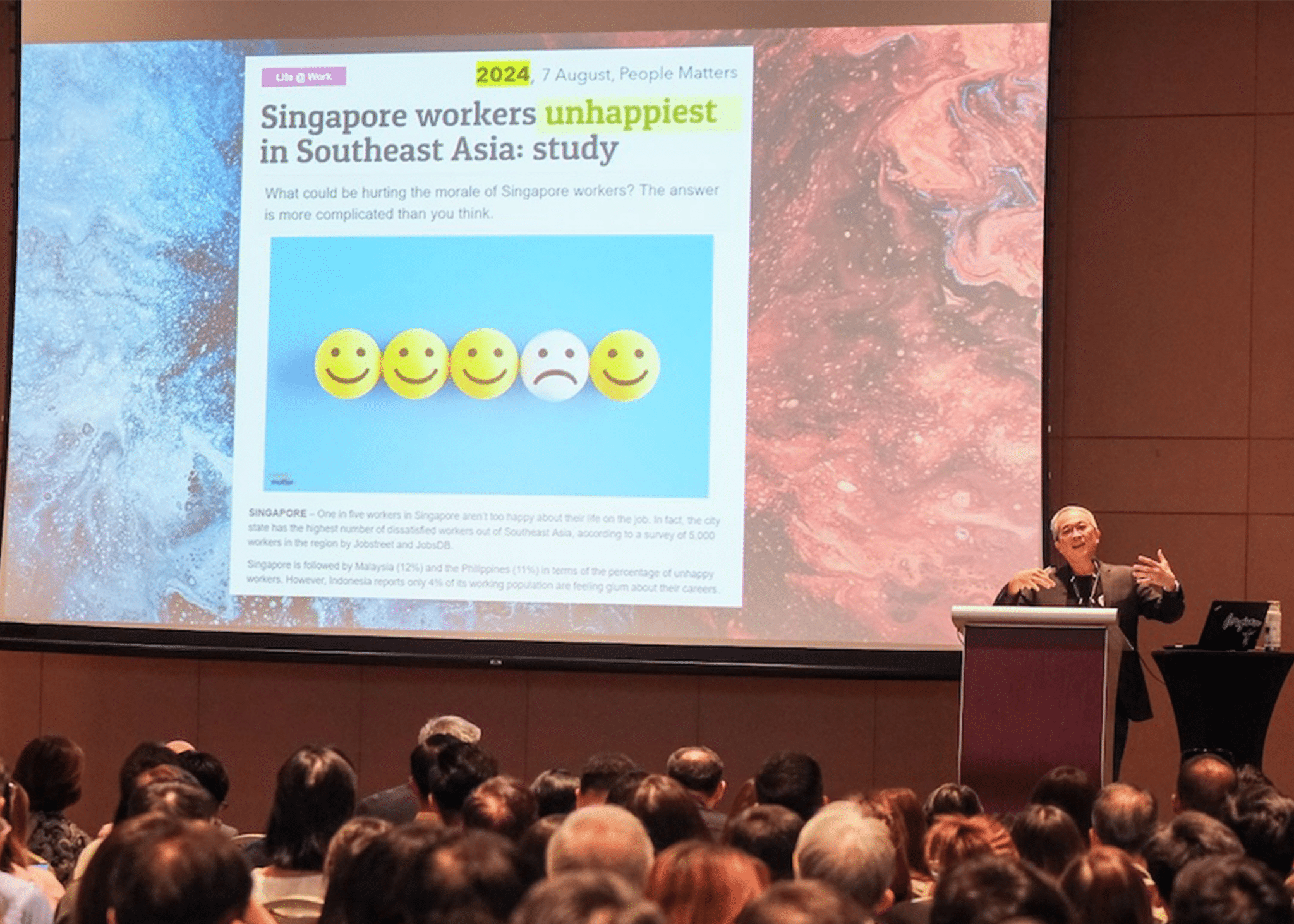
Lee Aik Soon/Upslash.com
We have a disconnect.
The faith that Christians in Singapore profess around our neck isn’t always a faith that can be discerned through our mouths or our hands – especially when it comes to a faith lived out at the workplace.
One of the joys of living in a multi-racial, multi-religious country is the fact that, because we rarely face persecution for our faith, most Christians feel no need to hide their religious allegiance.
“While faith remains very important for marketplace Christians in Singapore, only a fifth feel that they are fully living out their calling at the workplace.”
In a National Survey of Christians in the Marketplace – a demographically-representative survey of 2,000 Christians (Protestant and Catholic) in Singapore conducted over the past two years – 91.3% of respondents said “most people at work know I’m Christian”.
In a related question, only 13.7% of respondents said they keep their religious beliefs private at work. On the surface, that’s hugely encouraging. That means that 86.3% – more than 6 in 7! – are open to their colleagues knowing that they are Christian.
In fact, 91.1% said daily life would be “meaningless” without a sense of spirituality. Even more, 94.2%, said they “agree” or “strongly agree” that their faith has a “considerable influence” over all aspects of their life.
So, clearly, Christians in Singapore know that their faith should inform all of their life, all of the time. Yet when asked about how this is specifically lived out in their lives, the answers in the survey don’t seem to match the big-picture convictions.
For example, when asked how often they try to apply Biblical principles on values and ethics at work, 49.8% of those survey responded that they never did so, or only did so rarely/sometimes. That’s a far cry from the 9 in 10 we saw earlier.
Under a quarter of respondents – 22.3% – declared they were “purpose-driven Christians living out their calling in the workplace”. The remaining 77.7% said they could see God starting to use them, or know their call but aren’t living it out, or struggle to see how God could use them there.
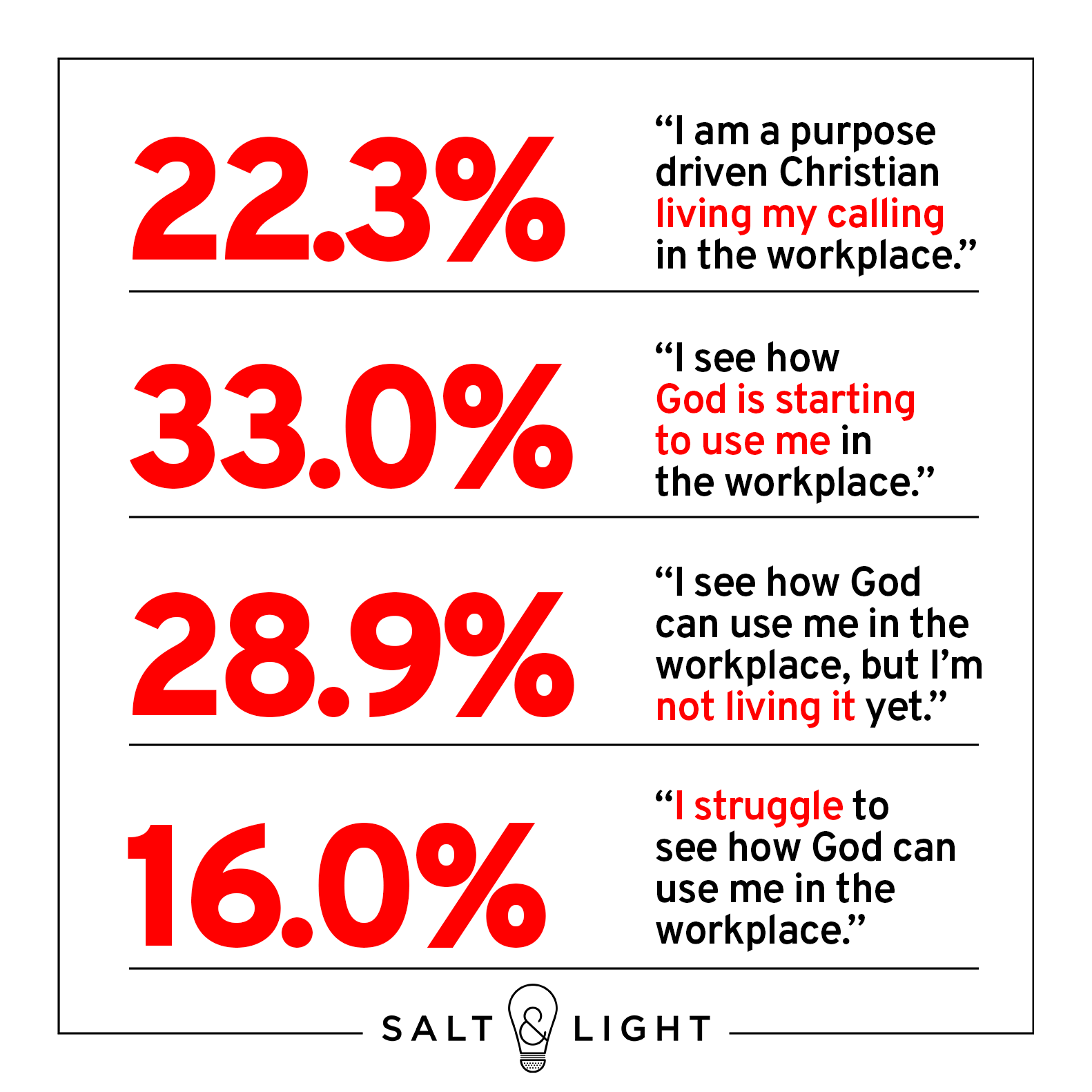
In other words: Most Christians don’t fully see why God put them where they work.
Asked about a few other faith-related activities, only about a third said they have items at their workplace to remind them of their faith; publicise Christian events or materials at work; or meet other Christians at work to pray.
None of these acts, of course, is in itself an absolute indicator of a faith fully lived out. But taken as a whole, it paints a picture that maybe there’s still some way to go in how often we as Christians bring Christ with us to the workplace.
“While faith remains very important for marketplace Christians in Singapore, only a fifth feel that they are fully living out their calling at the workplace,” surmises the author of the survey.
So, we have a disconnect between the theory and the reality of faith at work. But you didn’t need a survey to tell you all that.
You know it’s true because if it were you doing the survey, maybe you’d struggle to call yourself truly purpose-driven every day at your cubicle.
You know it’s true because at your cell group, when you get to the bit where you share about your life and its struggles, so much of the conversation is dominated by issues to do with colleagues, salaries and workplace ethics.
You know it’s true because of the times you’ve found yourself thinking at work, I can’t believe that guy is a Christian. And then wondering if others have thought the same about you, too.
Don’t feel bad if that describes you. The point isn’t self-condemnation, self-flagellation. The Bible is clear: We don’t see the reality of our situation just so we can be resigned to it. We take pause, take stock, then take action – appropriate steps to ensure we’re doing things God’s way.
But how does it look to work God’s way?
There is a common view of the Christian life that sounds right, but which I believe is intrinsically wrong. It goes like this:
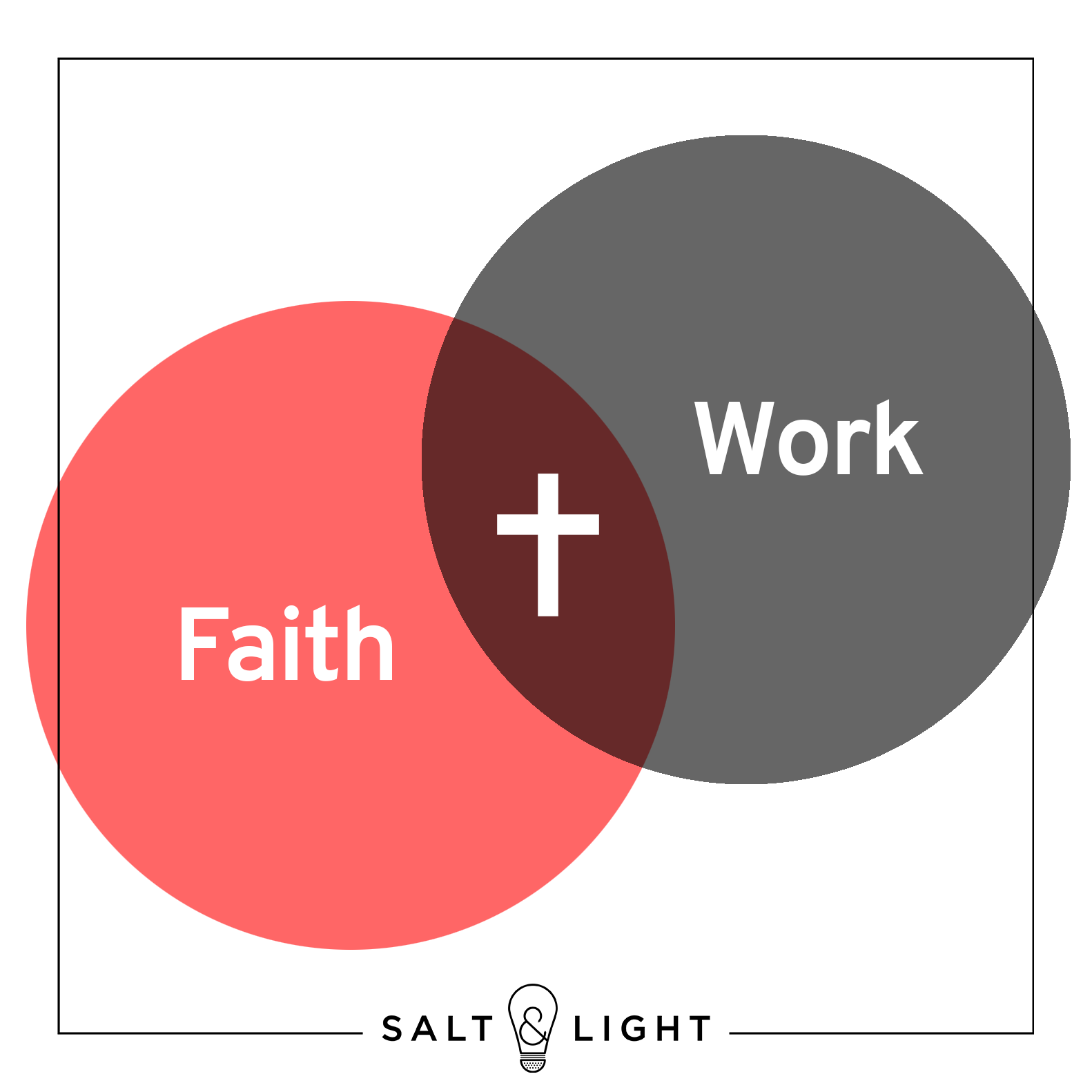
That’s you as a baby Christian. At first, God only influences so much of your work – the overlap in the middle. But, as you grow in the faith, it stands to reason that that area of overlap grows, according to this perspective. Like so:
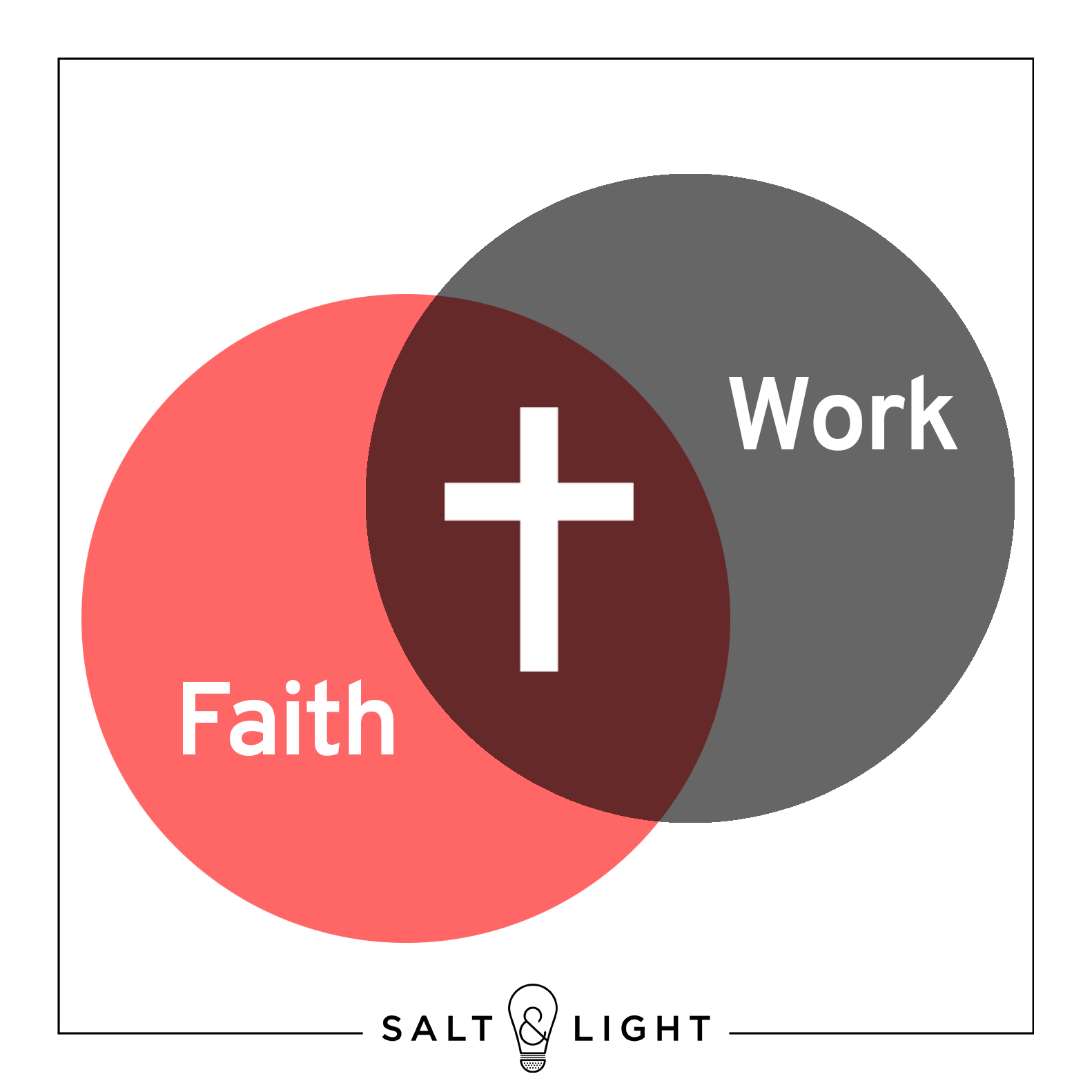
This all sounds right – and, as a starting point, it’s a healthy enough approach for a young believer. It’s no bad thing to desire more of God in your life!
But the problem with it is the idea that there is a point where faith and work intersect, as in a Venn diagram. The problem with having an intersect is that it implies that the end-goal has bits where there is no overlap, where the realms still don’t intersect. It’s gives the impression that it’s okay to have some bits where God doesn’t have influence over your work.
The truth is that faith and work aren’t meant to be separate, competing realms. No, work is meant to be a subset of faith.
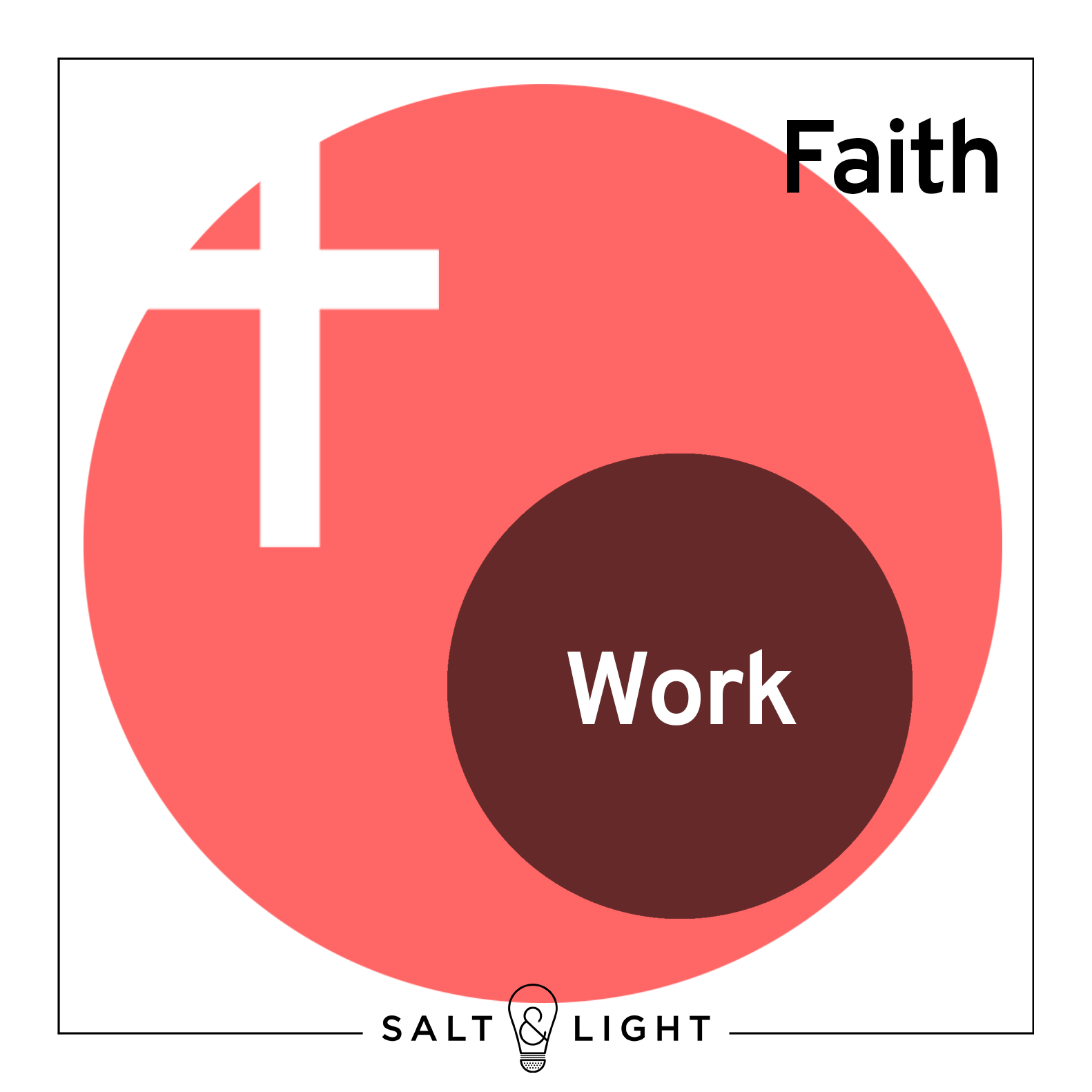
Our work is meant to be all His.
You are not your own; you were bought at a price. Therefore honour God with your bodies. 1 Corinthians 6:19-20
Whatever you do, work at it with all your heart, as working for the Lord, not for human masters. Colossians 3:23
Our work is meant to be all His. This is true even if we don’t know or want it to be true; it applies even before we surrender it to Him.
In other words, if we do it His way, He gets all the glory, and we reap all the rewards of obedience. But if we choose to go our own way – to hold some back for ourselves, as per the Venn diagram – because this realm is still all His, then the consequences set out by His Word and laws apply.
Many are the plans in a man’s heart, but in the end the Lord’s purpose prevails. Proverbs 19:21
And this explains one last sobering set of statistics I’ll quote you from the National Survey on Christians in the Marketplace.
Only 49.7% of Christians say they often sense God’s presence while at work. That means more than half don’t.
Similarly, 49.8% say they do not often see the connection between their worship and their work.
And 43.1%, say they never, rarely, or only sometimes view their work as a partnership with God.
All of which suggest that this is the current state of Christendom in the Singaporean office: Often there without the presence of God. Often unworshipful. And often not in partnership with God – a shame, because He put us where we are in the first place.
That’s the disconnect: We’re here for a reason, but we lose sight of that amid the busyness of business.
How are we supposed to be a good and godly worker and spouse and parent and child and ministry worker and cell member all at once?
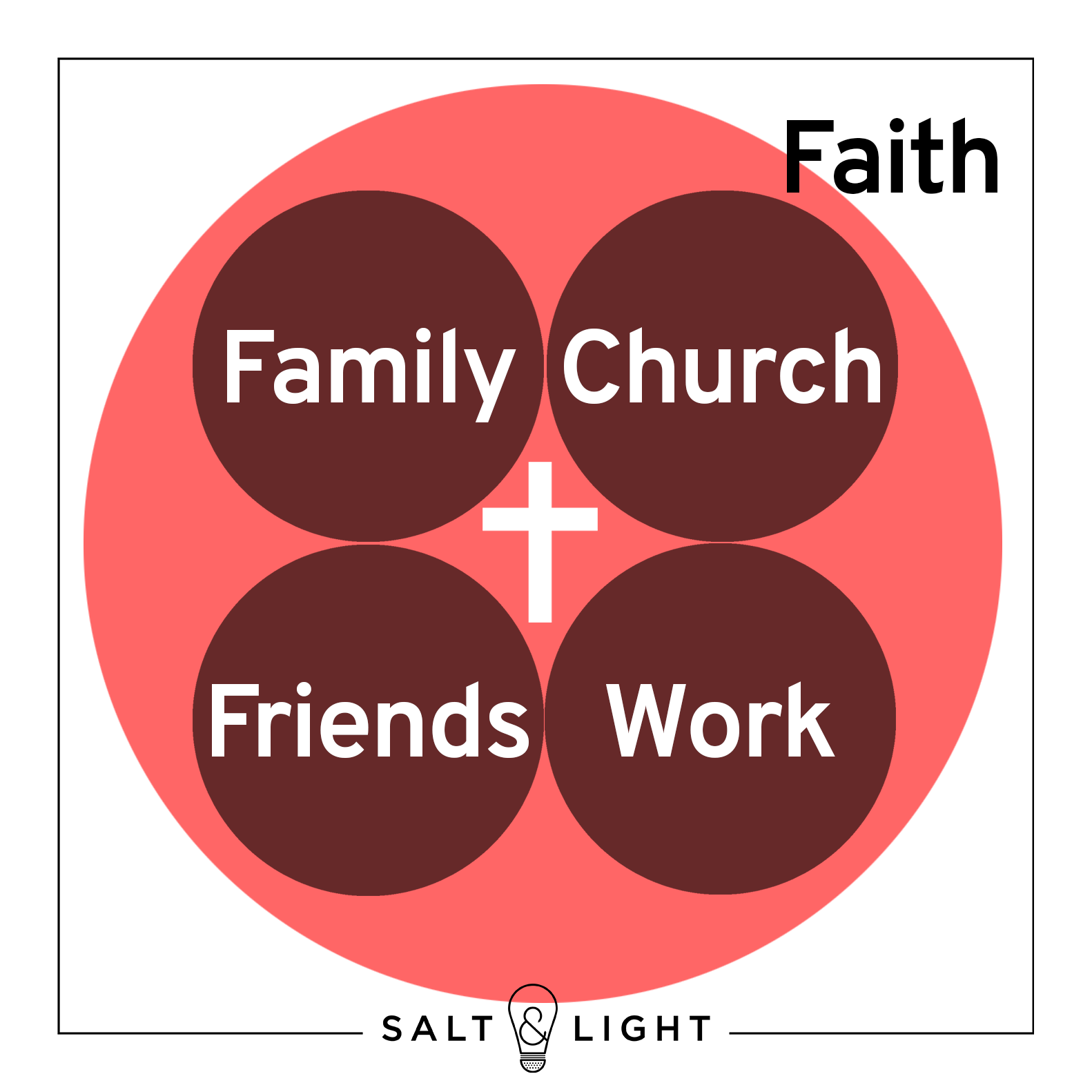
The answer is in the big red circle that all the other circles are mere subsets of. If all this belongs to God, then we let God do all this.
How? It’s impossible to answer that question in this one article – which is why we created this website.
It’s time we intentionally bring Jesus with us to work – He is Lord there, too.
Salt&Light is named after Matthew 5:13-16, the famous passage from Jesus’ Sermon on the Mount. Should salt lose its saltiness, He said, it’s only good to be thrown out. And why be given a light only to put it under a bowl?
We believe it’s time for the light in us to be uncovered, that it pours forth into every realm of darkness around us, particularly where we spend the majority of our waking hours – at the workplace.
We believe it’s time for Christians to arise and act out our collective and individual kingdom purposes, wherever we are placed.
We believe it’s time to address the disconnect. So that we don’t keep our faith and work as separate, occasionally overlapping realms, but intentionally bring Jesus with us to work – and acknowledging that He is Lord there, too.
We are an independent, non-profit organisation that relies on the generosity of our readers, such as yourself, to continue serving the kingdom. Every dollar donated goes directly back into our editorial coverage.
Would you consider partnering with us in our kingdom work by supporting us financially, either as a one-off donation, or a recurring pledge?
Support Salt&Light

